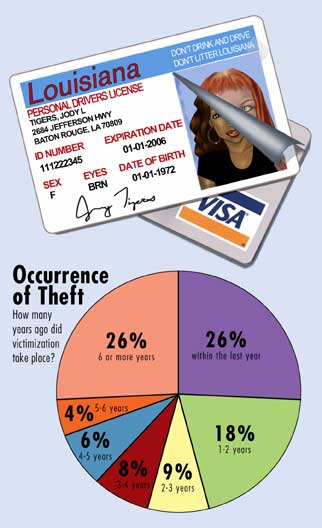A rise in identity theft indicated by a recent survey means students must be more aware of behavior that puts them at risk for victimization.
A recently released Federal Trade Commission study found that 4.7 percent of adults surveyed have been victims of identity theft.
This means approximately 10 million Americans have been victimized in the past five years, a much higher number than previously thought.
College students are just as susceptible to identity theft as other adults. Rebecca Labry, a biological engineering graduate student, was affected by identity theft when she applied for a loan her senior year of college.
Labry, who said she never received her loan check, called the company and was told she defaulted on a loan in the ’80s.
She discovered someone had taken out a loan in her name.
“I just don’t understand how they never caught it,” Labry said.
It took her six extra months to get the money from her loan.
According to the FTC survey, the average identity theft case takes about two to nine hours for the victim to correct.
“It was just a hassle,” Labry said. “It was annoying, because I didn’t have time to spend on the phone.”
The survey said 26 percent of all complaints registered happened within the past year, exceeding the 18 percent of those surveyed who had problems with identity theft 1 to 2 years ago.
Linda Foley, the executive director of the Identity Theft Resource Center based out of California, said the Resource Center “found a lot of discrepancies” between the FTC survey and the information in its own studies.
The FTC study said 85 percent of identity theft crimes involved the illegal use of existing accounts, such as credit card accounts or checking accounts, while 17 percent of the crimes involved opening a new account under the victim’s name.
Foley said those surveyed did not fully understand identity theft, partly because the FTC study mixed true identity theft and existing account takeover.
Existing account takeover, when a thief uses an existing checking or credit card account in the owner’s name, is more common than true identity theft.
Wilma, who declined to give her last name because she was an identity theft victim, is a volunteer at the Identity Theft Resource Center. She said college students must be aware of risky practices that can lead to identity theft. She said the posting of grades by Social Security number is a security problem at many colleges.
“Anyone can write it down,” she said. Starting a credit card account is very easy once a social security number is obtained, Wilma said.
She also said it is important for students to get their mail forwarded because pre-approved credit cards can be picked up, filled out, and begun “very easily” in another person’s name.
Foley said previous studies show new accounts are opened three times as much as existing accounts, probably because opening an account is an easier way to make money.
According to Foley, thieves usually have a month or less before they are caught when they take over existing accounts, but if they open a new account they often remain uncaught until the victim checks their credit.
LSUPD Cap. Ricky Adams said identity theft is not as prevalent here at LSU as it is in other places. However, he still cautions students.
“We have a tendency to be very trusting,” he said.
He said students can prevent identity theft by getting their mail forwarded, logging off general use computers completely, and avoiding telephone calls from solicitors asking for personal information.
IDentity crisis
September 15, 2003

IDentity crisis



